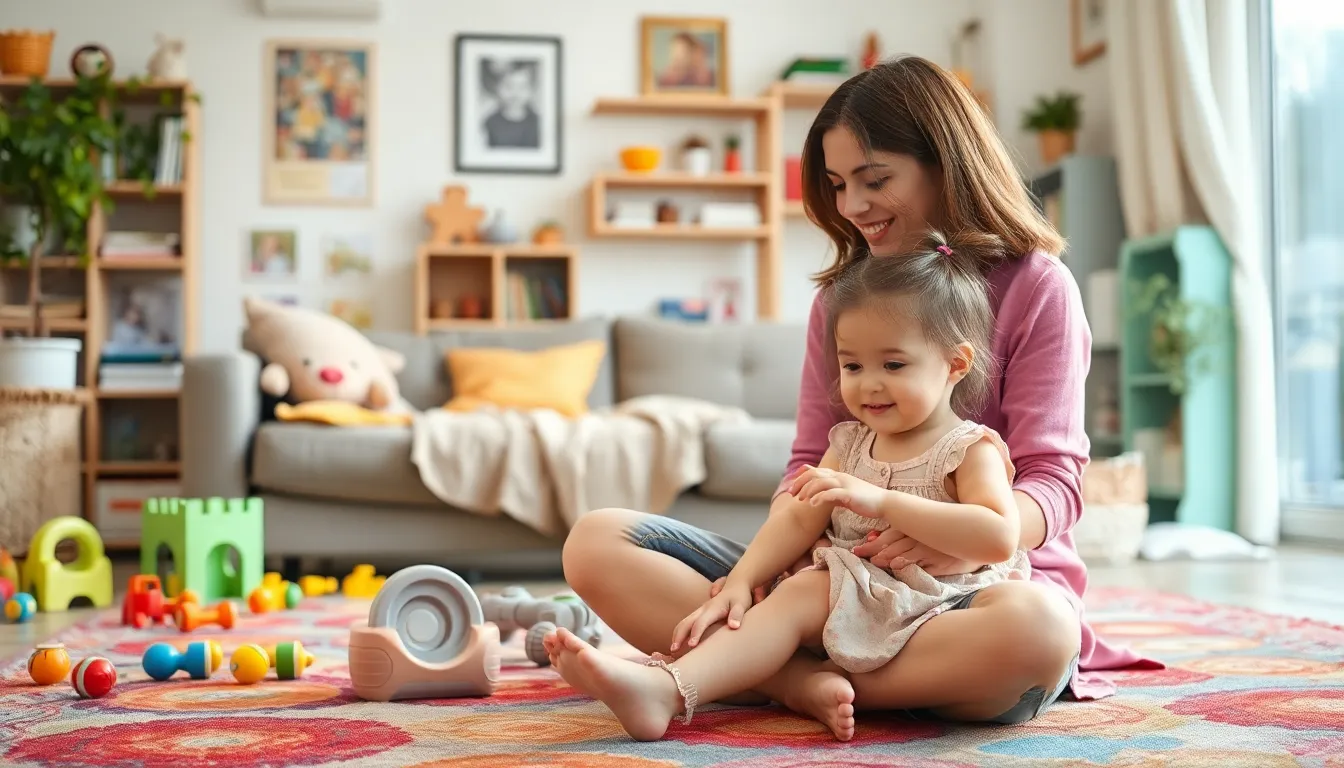Parenting isn’t just about providing for a child’s basic needs; it’s a dynamic journey that requires a unique set of skills. As children grow and develop, so do the challenges and joys of parenting. Understanding how to adapt and improve parenting skills can make a significant difference in a child’s emotional and social development.
In today’s fast-paced world, parents often seek effective strategies to nurture their children’s growth. Whether it’s fostering communication, discipline, or emotional intelligence, honing these skills can lead to healthier family dynamics. This article explores essential parenting skills development, offering insights and practical tips to empower parents in their vital role.
Table of Contents
ToggleImportance Of Parenting Skills Development
Parenting skills development plays a crucial role in fostering a nurturing environment. It directly influences a child’s growth, behavior, and overall well-being. Improved parenting skills lead to better communication, allowing parents to effectively express expectations and emotions.
Parents equipped with strong skills encourage healthy emotional development in children. They foster resilience, empathy, and emotional regulation. This development positively impacts children’s social interactions and relationships.
Additionally, enhanced discipline techniques contribute to better behavior management. Consistent and fair discipline strategies promote clear boundaries and expectations, leading to improved compliance. When children understand the consequences of their actions, they develop a sense of responsibility.
Effective conflict-resolution skills further enrich family dynamics. Parents who demonstrate these skills model positive behaviors for their children. Children learn to navigate disagreements constructively, facilitating healthier relationships outside the home.
Overall, investing in parenting skills development strengthens family bonds, enhances children’s learning abilities, and supports emotional intelligence. As parents cultivate these skills, they empower themselves and their children, creating a foundation for lifelong success.
Key Components Of Parenting Skills

Effective parenting skills center around three crucial components: effective communication, positive discipline, and emotional support. Each component directly influences a child’s development and family dynamics.
Effective Communication
Effective communication fosters healthy relationships between parents and children. Parents should engage in active listening, demonstrating attentiveness to their children’s thoughts and feelings. Open-ended questions encourage children to express themselves freely. Clarity in conveying expectations helps children understand boundaries. Consistent, age-appropriate dialogue strengthens trust and understanding, allowing children to feel valued and heard.
Positive Discipline
Positive discipline focuses on teaching rather than punishing. Parents should set clear, reasonable expectations that align with a child’s developmental stage. Strategies like natural consequences and logical consequences promote understanding of actions and outcomes. Parents can guide children through problem-solving exercises to encourage critical thinking and resilience. Maintaining consistency in disciplinary approaches helps establish firm yet fair guidelines, enhancing behavior management.
Emotional Support
Emotional support nurtures a child’s self-esteem and emotional well-being. Parents should validate their children’s feelings, affirming their experiences and emotions. Teaching children emotional regulation skills—such as identifying feelings and coping strategies—builds resilience. Encouragement and praise reinforce confidence and motivation. By fostering an emotionally supportive environment, parents enhance their children’s ability to navigate challenges and build healthy relationships.
Strategies For Developing Parenting Skills
Effective parenting skills development involves practical strategies that promote growth and understanding. These strategies enhance interactions between parents and children, fostering a supportive environment.
Self-Reflection And Awareness
Self-reflection and awareness are essential for parents to recognize their strengths and areas for improvement. Parents should assess their reactions to their children’s behaviors, identifying patterns that may affect parenting effectiveness. Journaling or discussing experiences with trusted friends or family members can facilitate deeper insights. Regular self-evaluation helps parents understand how their emotions influence their parenting approach. Additionally, mindfulness practices, such as meditation, can improve self-awareness and emotional regulation, enabling parents to respond rather than react in various situations.
Parenting Workshops And Resources
Parenting workshops and resources serve as valuable tools for skill enhancement. Various organizations offer workshops that focus on key areas, such as communication strategies, conflict resolution techniques, and positive discipline practices. Attending these workshops allows parents to gain insights from experts and connect with others facing similar challenges. Online resources, including websites, podcasts, and forums, provide ongoing support and knowledge. Families can access materials tailored to different developmental stages, helping parents apply evidence-based strategies to their unique situations. These tools empower parents to create nurturing environments that foster children’s growth and well-being.
Challenges In Parenting Skills Development
Developing effective parenting skills presents various challenges, often stemming from external pressures and diverse cultural contexts. Understanding these challenges assists parents in navigating their parenting journey more effectively.
Balancing Work And Family Life
Balancing work and family life significantly impacts parenting skills development. Parents often juggle demanding jobs and family responsibilities, which can lead to stress and burnout. Prioritizing time management becomes crucial for maintaining this balance. Parents may benefit from setting boundaries around work hours and dedicating quality time to engage with their children. Implementing strategies such as flexible work arrangements or seeking support from family and peers can alleviate some of this stress. Effective scheduling allows parents to participate in their children’s activities, fostering deeper connections and enhancing their parenting skills.
Cultural Differences In Parenting
Cultural differences introduce additional challenges in parenting skills development. Parenting styles vary widely across cultures, with each influencing expectations and approaches to child-rearing. Understanding these differences is essential for parents raising children in multicultural environments. Parents often face pressure to align their practices with societal norms while honoring their cultural backgrounds. Engaging in conversations about cultural values with children can build understanding and respect, strengthening family bonds. Parents can enhance their skills by educating themselves on diverse parenting practices, recognizing both similarities and differences, and adapting their approaches accordingly.
Developing parenting skills is an ongoing journey that significantly impacts both parents and children. By focusing on effective communication positive discipline and emotional support parents can create a nurturing environment that fosters growth and resilience.
Investing time in self-reflection and utilizing available resources empowers parents to adapt to their children’s evolving needs. Balancing work and family life may pose challenges but implementing strategies to manage stress can enhance parenting effectiveness.
Ultimately strong parenting skills not only strengthen family bonds but also equip children with the tools they need for lifelong success. Embracing this journey leads to healthier relationships and a more fulfilling family life.




